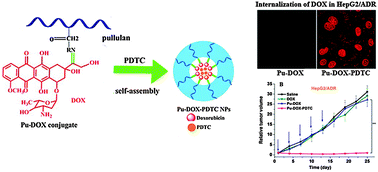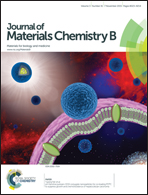pH-Sensitive pullulan–DOX conjugate nanoparticles for co-loading PDTC to suppress growth and chemoresistance of hepatocellular carcinoma
Abstract
Chemoresistance is one of the primary causes of cancer treatment failure. Pyrrolidinedithiocarbamate (PDTC), a nuclear-factor-kappa B (NF-κB) inhibitor, was demonstrated to be able to overcome chemoresistance and enhance doxorubicin (DOX) efficacy as a chemotherapeutic sensitizer. Combination of a chemotherapeutic drug and a sensitizer has emerged as a promising strategy for cancer chemotherapy. To ensure that the drug and the sensitizer could be accurately delivered to the target region for further exerting their synergy, a safe and effective delivery system is highly desirable. In this work, we fabricated a pullulan–adipodihydrazide–doxorubicin conjugate as a carrier to co-load PDTC for achieving enhanced anti-tumor efficiency and suppressing chemoresistance through targeted delivery with a pH-responsive drug release pattern. The self-assembled Pu–DOX–PDTC nanoparticles with a diameter of 128.1–179.7 nm exhibited excellent size stability in a neutral physiological environment and rapid drug release under acidic conditions. In comparison with treatment by single loaded Pu–DOX nanoparticles, the combination chemotherapy using Pu–DOX–PDTC nanoparticles synergistically induced the apoptosis of DOX-sensitive HepG2 and DOX-resistant HepG2/ADR cells, and suppressed HepG2 and HepG2/ADR tumor growth in vivo. Hence, the Pu–DOX–PDTC nanoparticles exhibited great potential in overcoming chemoresistance in hepatoma cells and markedly improved overall treatment efficiency against hepatocellular carcinoma.

- This article is part of the themed collection: 2015 Journal of Materials Chemistry B Hot Papers

 Please wait while we load your content...
Please wait while we load your content...